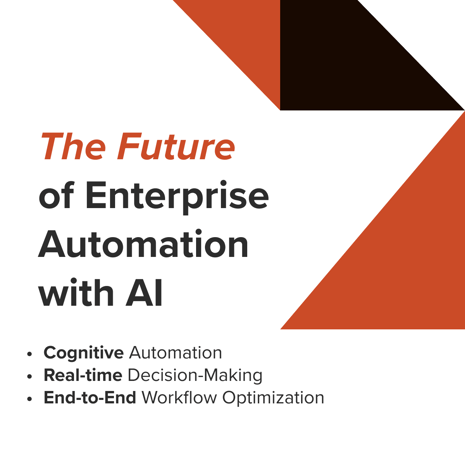Tonic3 Picks: Top AI & LLM Tools for Enterprise Workflow Automation

In today's fast-paced business world, the promise of Artificial Intelligence (AI) and Large Language Models (LLMs) to revolutionize enterprise workflows is no longer a futuristic dream – it's a tangible reality. Companies are increasingly leveraging these powerful technologies to automate repetitive tasks, glean actionable insights from vast datasets, enhance decision-making, and ultimately drive unprecedented levels of efficiency and productivity.
“Embed intelligence into workflows, not dashboards.”
Preston McCauley
Move Over "Vibe Coding": Meet the AI Systems Orchestrators Shaping the Future of Intelligent AI System Design
How to launch your AI initiative without feeling overwhelmed
- Start with a small, cross-functional squad (3–5 people)
Bring together one business lead, one data/IT specialist, and one ops rep. That’s enough to validate pilots without endless approvals. - Appoint a single “AI Ops Champion” (not a full department)
One person coordinates deployment, monitoring, and version control; add more resources only when usage truly scales. - Keep governance light and clear
- One-page ethics/compliance checklist
- Simple registry of models and prompts
- Quarterly review to adjust
- This covers the basics without drowning the team in bureaucracy.
- Pick an off-the-shelf orchestration platform
Connect and monitor your agents (chatbots, RPA bots, etc.) without building custom middleware. Most tools offer pay-as-you-grow pricing. - Offer bite-size upskilling
Two-hour hands-on workshops each month on prompt engineering and best practices, plus on-demand tutorials for deeper dives. These five manageable steps let you prove value quickly and scale only when the business demands it. Of course, this is just the beginning. As your use cases and your needs scale, you'll want to review and expand your AI governance to sustain the flexibility and transparency you started out with.
From Blueprint to Impact: 8 AI Platforms That Truly Automate Enterprise Workflows
With the strategic foundation in place, enterprise teams can more effectively cut through the noise and identify the solutions that truly deliver. This listicle dives into some of the leading AI and LLM tools that are making a significant impact on enterprise workflow automation, helping businesses streamline operations and empower their teams.
“A beautiful system that doesn’t move the needle? That’s not orchestration.”
Preston McCauley
1. Microsoft Copilot (and the broader Microsoft AI Ecosystem)
For enterprises deeply integrated into the Microsoft ecosystem, Copilot is a game-changer. Embedded directly within familiar applications like Word, Excel, PowerPoint, Outlook, and Teams, Copilot acts as an intelligent assistant, leveraging advanced LLMs to:
- Draft and edit content: From emails and documents to presentations, Copilot can jumpstart creation and refine existing text.
- Analyze data: In Excel, it can assist with data analysis, formula writing, and organizing unstructured data.
- Streamline collaboration: Within Teams, it can summarize meetings, provide transcripts, and share key insights from discussions.
- Enhance security: Microsoft Security Copilot helps IT teams protect organizations at scale, adhering to responsible AI principles.
Its seamless integration and focus on productivity within the Microsoft suite make it a powerful tool for enhancing daily workflows across various departments.
2. Abacus.AI: Building and Operationalizing Custom AI at Scale
For enterprises with unique and complex automation needs that off-the-shelf solutions can't fully address, Abacus.AI provides a powerful, end-to-end MLOps platform. It allows businesses to:
- Develop and deploy custom AI models: Utilize their own data to create highly accurate machine learning and deep learning models for specific use cases (e.g., customer churn prediction, real-time forecasting, personalized promotions).
- Leverage pre-built LLMs and generative AI: Access a wide array of language models to build custom AI agents for tasks like content generation, intelligent search, and sentiment analysis.
- Automate complex data workflows: Manage the entire lifecycle of AI models, from data ingestion and feature engineering to model training, deployment, and monitoring, ensuring continuous optimization.
Abacus.AI is ideal for enterprises that need to build bespoke AI solutions to automate critical, often data-intensive, workflows, leveraging their unique datasets for a competitive edge.
3. Serenity Star: The No-Code AI Agent Hub
Serenity Star is an enterprise-grade orchestration platform that lets business and tech teams create, deploy, and govern AI agents in minutes—no ML expertise required. It offers:
- One hub, 100+ LLMs: swap OpenAI, Anthropic, or open-source models at will to avoid lock-in and optimize costs.
- Drag-and-drop agent builder: non-developers spin up chatbots, RAG search, or workflow bots through a low-code UI, then expose them via API or n8n nodes.
- Agent Manager & Quality Studio: monitor usage, test prompts, fine-tune models, and roll back versions for safe, continuous improvement.
- Enterprise-grade governance: role-based access, SOC-2–ready compliance controls, cost dashboards, and multimodal orchestration (text, audio, vision).
Serenity Star and the Serenity AI Hub are ideal for organizations that need to scale many specialized agents quickly while keeping tight control over security, costs, and model choice. If this low-code/no-code option is of interest, we are a implementation partner, so we can schedule a customized demo of the Serenity platform.
4. Scale AI: The Foundation for Custom AI Automation
While not a direct workflow automation tool for end-users, Scale AI plays a crucial foundational role for enterprises building advanced AI systems for automation. They provide:
- High-quality data annotation and labeling: Essential for training robust and accurate machine learning models that power automation initiatives (e.g., for computer vision in quality control, natural language processing for document automation).
- Model evaluation and alignment: Ensures that custom-built AI models perform as expected and align with business objectives, reducing risks in deployed automation.
- Scalable data infrastructure: Supports the massive data requirements of complex AI projects, enabling enterprises to scale their AI development efforts.
For any enterprise embarking on custom AI development for automation, Scale AI offers the critical data infrastructure and expertise to ensure models are accurate, reliable, and ready for real-world deployment.
5. Moveworks: The Enterprise-Grade AI Assistant
Moveworks offers a sophisticated AI assistant designed to streamline workflows across an entire organization, particularly for employee support. What sets Moveworks apart is its "agentic AI" architecture, enabling it to:
- Autonomously interpret requests: Unlike traditional chatbots, it can understand complex employee needs.
- Make decisions and take action: It can resolve common IT and HR issues by interacting with various enterprise systems (CRM, ITSM, HRIS).
- Provide out-of-the-box automations: For everyday tasks, it offers pre-built solutions.
- Enable custom AI agent building: The Creator Studio allows developers and IT professionals to build tailored AI agents without extensive ML expertise.
Moveworks is ideal for large organizations looking to automate employee support at scale, significantly reducing resolution times and improving consistency.
6. PolyAI: Revolutionizing Customer Service Through Voice AI
Customer service is a prime area for AI-driven automation, and PolyAI specializes in developing hyper-realistic voice assistants for enterprises. Their solution helps automate customer interactions by:
- Handling natural, human-like conversations: Customers can speak naturally, and the AI understands intent, context, and even various accents, making interactions feel seamless.
- Automating routine inquiries: PolyAI can manage a significant percentage of inbound calls, freeing up human agents for more complex or empathetic interactions.
- Integrating with existing systems: It connects with CRMs and other enterprise tools to provide personalized service, recall past interactions, and ensure consistent information delivery.
- Providing 24/7 support: Ensures customers always have access to assistance, improving satisfaction and reducing operational costs.
PolyAI empowers large organizations to scale their customer support, enhance customer experience, and achieve significant operational efficiencies.
7. Blackbox.AI: Accelerating Development and Process Optimization
While often recognized for its coding assistance, Blackbox.AI extends its capabilities to broader enterprise automation by empowering development and operational teams. For organizations, Blackbox.AI can:
- Automate Code Generation and Optimization: Accelerate software development workflows by automatically generating boilerplate code, optimizing algorithms, and even developing complex program components with minimal human input.
- Streamline Data Analytics Workflows: Assist in automating data processing, analysis, and the identification of patterns, speeding up insights from large datasets.
- Enhance Process Optimization: Contribute to automating various internal processes, particularly those involving structured data and rule-based decision-making, reducing manual effort and improving efficiency.
- Intelligent Debugging and Testing: Automate the identification and resolution of software bugs and assist in generating test cases, thereby improving software quality and development cycle times.
Blackbox.AI offers enterprise plans tailored for larger organizations, providing tools that integrate into existing development environments and contribute to a more efficient and automated software delivery pipeline and internal process management.
8. Workato: Integration and Intelligent Automation in One
Workato is an enterprise automation platform that uniquely combines integration capabilities with intelligent workflow automation. Its AI-powered system offers:
- Pre-built connectors: Access to over 1,000 app connectors simplifies integration.
- AI-powered workflow suggestions: The platform intelligently suggests workflow optimizations.
- Low-code approach: Designed for business users without deep technical expertise, it uses a recipe-based approach with pre-built templates.
- Complex logic handling: Capable of managing intricate business rules and processes.
Workato empowers both business users and IT to collaborate on building robust and intelligent automated workflows.
The Future of Enterprise Automation with AI
The integration of AI and LLMs into enterprise workflows is no longer a niche application but a fundamental shift in how businesses operate. These tools are moving beyond simple task automation, enabling:

- Cognitive Automation: AI systems now read, classify, and extract meaning from text, images, and audio that used to need human judgment.
Example: a contract-review tool that scans NDAs and highlights non-standard clauses for a legal team in seconds. (e.g., document review, sentiment analysis). - Real-time Decision-Making: AI algorithms can analyze vast datasets and trigger immediate actions, crucial for areas like fraud detection or dynamic supply chain management.
Example: a bank’s fraud engine that blocks a suspicious transaction before the cardholder even gets an SMS alert. - End-to-End Workflow Optimization: AI orchestrates an entire process from first input to final outcome, adapting as new data arrives.
Example: a mortgage platform that auto-ingests applications, verifies documents, scores risk, and issues approvals. - Hyper-Personalization: Tailoring workflows and customer interactions to individual needs, leading to improved satisfaction and engagement.
Frequently Asked Questions:
Start with a small, cross-functional team of 3–5 people including a business lead, data/IT specialist, and operations representative. Appoint a single “AI Ops Champion” to coordinate deployment and monitoring. Keep governance light with simple ethics checklists and model registries. Use off-the-shelf orchestration platforms and provide bite-sized upskilling workshops to your teams.
Microsoft Copilot and the broader Microsoft AI ecosystem are ideal. Copilot integrates directly into apps like Word, Excel, PowerPoint, Outlook, and Teams to assist with content creation, data analysis, collaboration, and security, enhancing productivity within familiar workflows.
Moveworks uses an "agentic AI" architecture that autonomously interprets complex employee requests, makes decisions, and interacts with enterprise systems to resolve IT and HR issues. It also offers pre-built automations and tools for building custom AI agents without deep ML expertise, making it ideal for large-scale employee support automation.
Serenity Star is a no-code AI agent platform that enables business and tech teams to create, deploy, and govern AI agents rapidly. It supports over 100 LLMs, offers a drag-and-drop builder, agent monitoring and quality tools, and enterprise-grade governance, making it easy to scale specialized AI agents securely and cost-effectively.
AI now enables cognitive automation by interpreting text, images, and audio; supports real-time decision-making such as fraud detection; orchestrates end-to-end workflows adapting to new data; and delivers hyper-personalized experiences tailored to individual needs. This leads to smarter, faster, and more efficient business operations.



.png?width=800&height=363&name=Inside%20the%20Agent%20Brian%20(3).png)